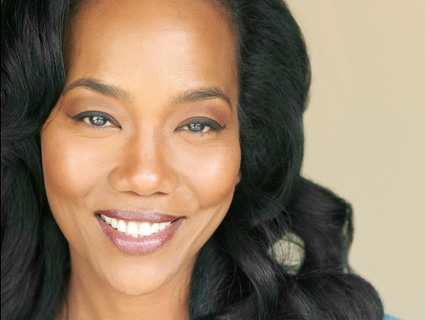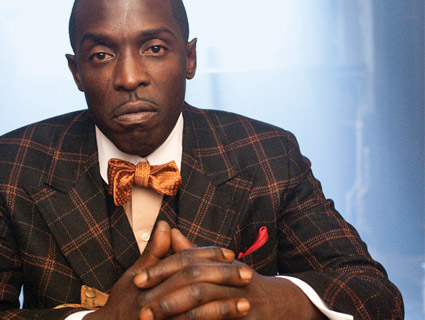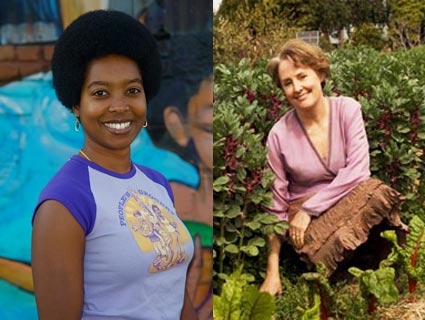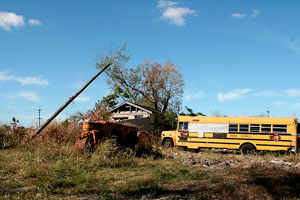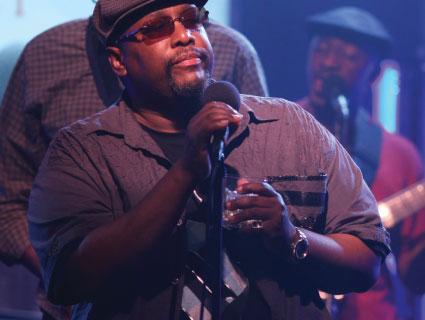
Paul Schiraldi/Courtesy HBO
Actor Wendell Pierce, best known as foul-mouthed homicide detective Bunk Moreland on The Wire, plays a struggling trombonist in Treme, the latest HBO offering from writer/producer David Simon. The show’s backdrop, post-Katrina New Orleans, is all too familiar for Pierce, who spends his time off camera helping to rebuild the city, including the neighborhood where he grew up. This year, Pierce launches Sterling Farms, a nine-store grocery chain in the city’s food deserts, where the big players have refused to locate. We caught up with the actor and public citizen in the midst of filming Treme‘s latest season. You can listen to our chat here, which you should of course do, because he sings some.
Mother Jones: So I hear you’re known around New Orleans as “Saint Wendell” for all of your rebuilding efforts, and I was just wondering…does that means you’ve stopped swearing?
Wendell Pierce: First of all, I don’t know how true that is. I think somebody kind of may have mentioned it, and now people have picked up on it. But I doubt if I’m known as Saint Wendell by many. And no, I have not stopped swearing.
MJ: Okay then, on that topic, in the words of Bunk, “giving a fuck when it ain’t your turn to give a fuck.” Is it now your turn?
WP: It’s all our turns. We’re in a place where, especially in New Orleans it was one of those things where if not now, when? If not me, who? It’s so clear that we are still in a crisis mode when it comes to the recovery of the city. It was inevitable that I had to get involved. And I wanted to be able to answer some young kid in the future who says, “Mr. Pierce, what did you do, in New Orleans’ darkest hours?” I wanted to have a proud answer.
MJ: And what inspired you to start Sterling Farms?
WP: As I was bringing back Pontchartrain Park, the neighborhood that I grew up in, I put together this redevelopment of housing, solar, and geothermal, and I had to incentivize people to come back; I realized it’s on me to kind of get off the sidelines. I knew about food deserts, and then Michelle Obama brought attention to food deserts. One of the richest countries in the history of the world having communities where people have to go over half an hour to get to fresh produce and food is unacceptable. And I feel as though the two can coexist, that you can actually be a successful business by filling that need. Classic Economy 101: fill the need, there is a demand, supply and demand.
MJ: Speaking of encouraging fresh and local food consumption, I just saw a giant bus ad: “Chicken McNuggets, 20 for $4.99.” That’s 25 cents a pop. How do you compete with that?
WP: You have to compete with it. Everybody says, “How are you going to compete with fast food, with all these low-cost choices?” There’s nothing else competing with them! They have a monopoly in the community! So that’s the challenge. You have to make it affordable. Sterling Farms is going to be competitive when it comes to pricing. At the same time, give people a decent living wage. First-source hiring from the community. Cooking demonstrations in the store. A farmer of the month. A monthly cook-out or, in New Orleans, a crawfish boil. Where the community actually gets to prepare meals, for sale, and at the same time the sale of those meals will go to something that the community determines is worthy. We’ll have the community actively participating in the store, and having access to those foods, and have chefs come in to show them how to prepare good, healthy meals, and at the same time have access to affordable, healthy choices. I’ll compete with the nuggets.
MJ: Well, lots of urban centers could use your stores, I’m just thinking of my neighborhood in Oakland, California. Do you have a plan or a vision to go national?
WP: You have to crawl before you walk, walk before you run, you know the old adage. What we want to do is in our first year, really dig in, get the stores up and running in the communities in New Orleans, because that’s where we’re starting. We have had inquires from different communities nationwide. This will be the template. We have to make sure it works, and then as it develops, we hope to branch out. We’ve had inquiries from within the Southeastern region of the country, and if past behavior is the best predictor of the future, all our competitors will still stay out of the neighborhoods, in Oakland, in the South Side of Chicago, in the lower Ninth Ward of New Orleans, in Pensacola, in all of those communities that we know are underserved. Southeast Washington, DC. Even if we show them success, there’s so little respect for the community by American enterprise that they’ll sit on the sidelines.
I’m not the first. Actually, Magic Johnson has shown that it can be done. Starbucks never gives out franchises, but they gave one to Magic Johnson to bring it to Harlem. And Magic Johnson’s pitch was: “Poor black folks will buy $5 cups of coffee, too.” And now it’s one of the biggest stores in New York. Yet, even with Magic Johnson showing the success of it, American enterprise has still stayed on the sidelines. So it’s gonna be those who decide to go into the communities, who have respect for the communities, and respect for the consumers in those communities, who are gonna do well. And Sterling Farms is going to be one of those stores.
MJ: You’re a big sports fan. How big a role can sports play in the recovery and spirit of the community?
WP: The power of a sports team in a community it’s almost indescribable. I’m a big Saints fan. The NFL is such a large, multibillion dollar enterprise with fan loyalty because they have provided not only entertainment for sports fans, but memories, good memories, family memories to these fans, that can only bring about good will. When a sports team is doing well in a city that’s going through tough times like New Orleans, like Detroit, it bolsters this real sentiment of “we can get through this.” And when you have that sentiment, it becomes more than feelings: It’s transported into action.
Translate it into New Orleans [when the Saints won the Super Bowl], volunteerism went up, people who had never gone to the Lower Ninth Ward went to the Lower Ninth Ward, got involved, got active. There was a sense of community. That’s why I’m an artist; that’s the role of an artist. What thoughts are to the individual, art is to the community as a whole. That’s where you reflect on who you are, who you hope to be, what you’ve gone through, and where you hope to go. That’s why you do art: It’s a tangible thing that inspires people into action. And it’s the same thing with sports teams. The Saints make you feel good. You see the communal spirit on Sunday afternoon. Someone who’s totally different, that guy with the white-collar job sitting next to the woman who’s a blue-collar worker. Someone who works on the docks and someone who works in the bank, they actually have a common goal, and they understand that this can be translated past Sunday afternoon. And it really does have an impact on the psyche of the city, and when you have that impact on the psyche it translates into action.
MJ: And growing up in a place so alive, like New Orleans, did that have a big impact on you becoming an artist?
WP: New Orleans, more than many places I know, actually tangibly lives its culture. It’s not just a residual of life; it’s a part of life. Music is at every major milestone of our life: birth, marriage, death. It’s our culture. And culture is the intersection between people and dealing with the journey of life itself. How to deal with life, how a people deals with life is literally manifested in its culture, in its food, in its music, in its art, in the way you dance, the way you communicate. And New Orleans always has culture in its everyday living. We sing when we talk, [singing] “Hey baby, how you doin’?” Sing when you speak to each other. The whole idea of jazz came about was the interpretation of the human dialogue, trading fours. When someone’s soloing and someone picks up the solo and plays it back at ’em, it was the imitation of the human dialogue. It was how people spoke, through music.
When you look at the beginnings of jazz in Congo Square, these captured Africans who couldn’t say anything to their captors, so they take their captors Europeans music, oom-pah-pah-oom-pah-pah, and they combine it with their African six [sings rhythm] and then you have jazz [sings another rhythm]. And it’s saying, I’m taking what you’re doing to me; look at my comment back to it. So it’s the expression of what you’re going through in life, which is a part of the culture. And in New Orleans, that’s every day. That made me a student of human behavior. Like the creativity of food. When we call and ask someone how was their day. They always say, “Oh, it was good. I had roast chicken with collard greens,” and they start talking about the food. We don’t eat to live, we live to eat because that’s a part of the creativity of the day. People speak about their meals as if it’s this wonderful creation that they made. “Oh I had a great day, man, you shoulda seen what I cooked.” And there’s a communal sharing thing, here’s the pot.
And that’s across the board, our social aid and pleasure clubs came out of the fact that black folks could not get burial plots, could not get into hospitals, were red-lined by insurance companies, so they put together social aid and pleasure clubs to do second lines. If your mother gets sick, this group will put together the money to make sure that she’s taken care of. If your father dies, we’re gonna send him off nice. That’s the evolution of the jazz funeral. You better grab a handkerchief and an umbrella because it’s hot, but we’re gonna follow the family to the cemetery. They’re the first line, we’re the second line. Take the music in with a dirge, and when we leave we’re gonna celebrate his life, we’re gonna leave with some up-tempo dance music, and dance all the way back home. That’s how culture literally becomes a part of civic activism. We’re not allowed in your hospitals, we’re not allowed in even your burial plots and cemeteries, we’re gonna pool our money together and make sure that we take care of each other in a communal way. That’s the culture of New Orleans. That’s the reason I’m an artist.
MJ: What’s it been like working with David Simon on two series now?
WP: David Simon is a brilliant writer, brilliant at being able to take what is ordinary and make it extraordinary. He’s celebrating peoples’ lives by pointing out that our lives aren’t arbitrary; that’s why people connect with his characters so freely and so easily, they find the extraordinary in the ordinary. And he’s also very good at coming into a community, and being able to see the brilliance in what people in that community take for granted. And he’s able to share that universally. You look at The Wire and you’ll never be able to look at some kids slinging drugs on the corner the same. You’ll never be indifferent to them.
It’s the same way with New Orleans. He was able to come in and say: “Let me show you what the people are going through. It’s not some tragedy on CNN. It’s not some tragedy that you’re seeing on 24-hour news. There are actually lives behind this that are going to be impacted for generations to come. And let me show you how, in spite of everything, these people’s culture was so important to them that it is the thing that they fell back onto to give them strength to deal with the hurdles and challenges in front of them.” And that’s the brilliance of David Simon. He’s able to show that humanity. The extraordinary in the ordinary. To be able to come into the drug community of Baltimore, and the politics of Baltimore, the cultural world of New Orleans, the aftermath of major disaster, and make a comment on peoples’ lives from just the very simple and then have profoundly moving statements about the decay of cities, about the evilness of keeping whole peoples in the underclass of this country, the moral ambiguity that’s happening, the breakdown of urban America—he can make comments about those broad themes with very simple, ordinary acts of everyday people. That’s his brilliance.
MJ: Treme is set in your hometown. Antoine must be a very personal role for you.
WP: It’s a seesaw of emotions. Part of me is like, “Oh, god, I gotta go back and fight that fight.” You so identify with the difficulties of the recovery of New Orleans and it’s so real, and it has become so much a part of my life that I forget at times that I’m just a television actor. But I wouldn’t want to be anyplace else. Art imitating life and life imitating art, and it’s beyond the job—it will always be a marked period in my life. I can almost imagine what it was like to rebuild Europe after World War II. The devastation of Native Americans after the Trail of Tears, and saying, how can we keep our tribe together, how can we keep our culture together after our land has been stolen, our lives have been devastated? It’s something that I’m not alone in, that I’m not the first to go through it.
MJ: With so much redevelopment in New Orleans, is the city at risk of losing its unique flair?
WP: There are those who don’t want the city to come back to come back the way it is. There are those who want to get rid of the poor, to not make it a black city again—so you have to fight those fights. Listen, we had someone who openly on the front page of the Wall Street Journal after Katrina saying that we’re going to be able to get rid of the people we don’t want. Like this so-called experiment of the charter school system. Take John McDonogh, we call it John Mac, one of the toughest schools prior to the storm, where we actually had a double murder with an AK-47 in the gym. Tough school. Came back. The state has taken over the education system. Now we have the state superintendent who said unless you give this school over to a charter school, I won’t appropriate the money to renovate John McDonogh. People say, “Well why, Wendell, why would you want those poor kids in that neighborhood school?” Because there’s nothing in the new policies that guarantees the neighborhood kids get to go to their neighborhood school—under the guise of open admissions there are prerequisites, there are qualifiers, and that’s not open admissions. It’s upside-down; it’s focusing on all of those students who can take advantage of the choices of charter schools. But what if it’s a kid who doesn’t have responsible parents? Who doesn’t come from a really great home? We say, “Tough luck.” And I’ve had people tell me what about personal responsibility? When he or she becomes 18, yes, personal responsibility, but until then they are at the mercy of those subpar parents and subpar people around them. That’s not the role of public education.
My mother was a teacher for 40 years. She was part of the United Teachers of New Orleans. The water hadn’t even receded out of New Orleans yet, people were still on top of their rooftops, waving, waiting to be rescued, and the priority the state takes is to get rid of all the teachers. Fired all the teachers, a predominantly African American female union, shut down over night.
Alright, I’m going to get off my soapbox—I’m talking to Mother Jones all of a sudden there!
MJ: I don’t know, maybe people should be calling you Mayor Wendell.
WP: It’s not about Mayor.
MJ: Well, maybe down the road.
WP: I choose to try to do those things that are necessary, from outside in.
MJ: You play a musician in Treme. You taught yourself to play the trombone, is that right?
WP: Well, yes, I’m learning how to play the trombone. I wouldn’t call myself a musician.
MJ: Have you ever played a musical instrument—like when you were growing up?
WP: In New Orleans, every kid at least grabs a trumpet for a week. I made it to two weeks.
MJ: How do you typically prepare for roles? Like for Antoine, for B.B. King in an upcoming movie, or Bunk for that matter.
WP: It’s really just complete immersion into the world. With Bunk, I actually hung out with the real Bunk in Baltimore. I sat in on ride-alongs, interrogations, went to crime scenes, all of that. You ask those personal questions about why they became police officers, what’s important to them, and you combine that with your own creations in the role. Not that “Ooh, I always wanted to become a detective.” That’s great. No, I became a detective because I wanted to change, I wanted to get at that 1 percent who are making it awful for everybody else, that small element of crime that’s overwhelmingly disproportionately affecting good, hard working people. I discovered, across the board, specifically why African American men became police officers was because the force didn’t reflect the neighborhood they grew up in. And many times they know the exact criminals they’re going to be chasing. And that was reflected in The Wire at one point with Bunk and Omar. When it comes to Treme, I grew up with so many musicians: Wynton Marsalis, Terence Blanchard, Donald Harris, Harry Connick Jr. I was a big fan of Rebirth Brass Band and Kermit Ruffins. So to research Antoine was a lot easier.
MJ: What do think you’d be doing now if you weren’t acting?
WP: I would be another artist in a different field. I have so much love for art. In America we have lost the sense of what is important about art. Where we as a community reflect on our journey, why we’re here, what we hope to be, our faults, our strengths, our inadequacies, our triumphs. As you lie awake in bed at night and wonder about your life and reflect on your life what those thoughts are to the individual, art is to the community as a whole.
Doing Treme, you get to see the power of art because all around the city of New Orleans there are watch parties. People talk about it in a different way on Monday, and it helps them deal with the recovery that they’re in the midst of. Because it’s someone actually recognizing what we’ve gone through just a few short years ago were about four years about the actual show itself. It just lets you know that although you may not feel it, you have made some progress, that there’s some reflection on what you’ve done, what you’ve gone through, how much further you have to go. And you couldn’t get a better example of that than on Sunday night in New Orleans, where all over the city people are watching this show Treme and its almost like a group therapy session.
MJ: You saw the movie The Help with your mother. You called it “segregation light”—it struck a pretty personal chord in you, yes?
WP: The movie is touching; it’s well done. But it struck a chord in me—that my mother who lived through segregation, who had seen the pain of having someone burn up someone’s home and car because a nigger wasn’t supposed to own a new car. The reason I grew up in New Orleans was that my mother from Assumption Parish had to come to New Orleans because that was the closest school for any black person—there was no school for black kids in her parish, no high schools. You could only go to the city, and Booker T. Washington was the only school you were allowed to go to. You have to realize the depth and the evilness of segregation, that people died. I did a play in New York, about George Stinney Jr., who was the youngest person ever executed [in the 20th century] at 14 in 1944 for killing two white girls, and they coerced a false confession out of him by offering the kid ice cream, which he loved. Sitting there knowing that this was a real person who was executed just a generation ago, a little 14-year-old black kid lost his life because of that evilness; when we saw The Help, I looked and saw my mother and she was just seething, and she told me something that I’d never heard before—she said, “When I was college, my summer job I was the help. I couldn’t use the bathroom in the home. I had to go outside.” She said that as bad as life was depicted in the movie, it couldn’t compare to how awful it was. So it was an emotional rollercoaster to watch it with my mother, to see her anger and pain. It was a palatable easy way to kind of make a comment about segregation. For her it was segregation light—it wasn’t enough. Every year there are a multitude of films, at the Pan African Film Festival in Los Angeles, at the Urbanworld Film Festival in New York, the American Black Film Festival in Miami, films that never get distribution because the stories are not going to be so palatable, films that never get distribution because they actually deal with subject matter that Hollywood never opens its mind to.
MJ: David Simon’s white, obviously, but The Wire, it got critical acclaim but it didn’t get into everyone’s living room for the same reasons.
WP: It’s the same thing. All of a sudden they don’t want to see it. Because of certain assumptions and because of stereotypes. I’ll give you a perfect example. Many people have come up to me and said, “Hey, man, I always heard about The Wire.” Black folk too. “But I don’t want to see it. It’s the same ol’ thing: We are always the thugs, always the criminals.” I say, “Hold it now, did you see it?” I said. “We’re the mayor, the police commissioner. Yeah, we’re the drug dealers too. There’s teachers, there’s lawyers, there’s a more truthful authentic portray of black folk.” Even in Treme, people say, “Why all the black people don’t have a job on Treme?” I’m like. “Hold it, I have a job: I’m a musician. I may be a scalawag, but I’m taking care of my kid and my girl. Big Chief is a great carpenter. You have the dentist [and] my ex-wife, who owns her own small business. What show you looking at?”
But people are so conditioned by formulaic television and formulaic movies. You bring them reality, and people don’t even recognize it because they’re so conditioned by what the media has portrayed. If I told people, “Hey, listen, I’m going to have a sensationalized murder trial of a running back superstar African American who has killed his ex-wife who’s Caucasian, lead prosecutor is going to be a white female, with a African American male as a prosecutor, he’s going to have an Armenian defense attorney, with an American Jewish lawyer on the defense team, also, the judge is going to be Asian”—people would be like, “Ah man, come on, this rainbow coalition!” And you know, it’s the O.J. Simpson trial! But Hollywood would see it as, that’s not truthful, that’s not real.
MJ: What role of yours are your parents most proud of do you think?
WP: I think they’re proud of the work I’m doing in New Orleans in real life, trying to redevelop Pontchartrain Park. As a young couple they came there over 50 years ago at the height of segregation. It was the only place where blacks could buy homes. He was a young soldier coming back from World War II. It was just an idea; it was a real leap of faith for them to purchase a home and create this neighborhood. It was separate but equal, so out of something ugly, their generation made something beautiful.
And so here it is 50 years later where [Pontchartrain Park] is an incubator of talent. The first black mayor, Dutch Morial, his son Marc Morial became mayor. Lisa Jackson, who’s the EPA director now. Terence Blanchard, multi-Grammy-award-winning trumpet playing and jazz composer. I dare put myself in that mix. And lawyers and doctors and different leaders of the community, and it became an incubator of talent, what Baldwin Hills is to LA, what Sweet Auburn is to Atlanta. It was the black working class and middle class. And in their golden years it was destroyed by Katrina, and I knew that we owed it to their generation to put out a call to action to everybody in my generation to step up to the plate to rebuild it so that when they leave this earth they know that what was the foundation for all their kids to go off and be successful citizens and people of the world isn’t lost, and that that legacy is passed on. I think that’s the thing their proudest of. When it comes to acting, they’re just happy that I’m working.
